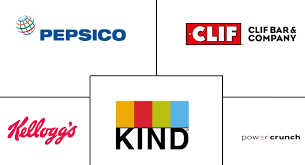Kind Bar Company New Way
- Deb Bandyopadhyay

- Feb 18, 2021
- 6 min read

Profit & Solutions Management Research Publication Series
Researched & Written by Deb (Debadip) Bandyopadhyay
Kind LLC, stylized as KIND LLC and sometimes referred to as KIND Snacks, KIND Healthy Snacks or KIND Bars, is a food company based in New York City, New York.
It was founded in 2004 by Daniel Lubetzky. The company manufactures eight product lines.
Company founder Daniel Lubetzky founded KIND in 2004. KIND reached one million dollars of sales in the first year.
In 2008, private equity firm VMG Partners invested in KIND. The investment enabled the company to scale its sampling efforts to get more people to try KIND bars. When VMG got involved, KIND bars were only sold in 20,000 locations and Lubetzky’s sampling budget was $800. By 2009, that budget was $800,000 and offering free samples became a large part of the KIND marketing plan. In 2014, Lubetzky bought out all of VMG’s shares.
Today, KIND Bars are sold at more than 150,000 stores in the United States. In 2014, they sold over 458 million bars and granola pouches, almost doubling the sales of 2013. The company now has nearly five hundred employees.
In 2017 Mars brand purchased a minority stake in KIND. The deal valuated the company at over $4 billion. In 2017 sales had reached $718.9 million.
KIND acquired North Carolina-based Creative Snacks in October 2019
In February 2020 KIND launched an expansion into frozen bars, refrigerated nut-butter bars, and chocolate clusters
Protein bars are popular among health enthusiasts, athletes, people too busy to eat a proper meal and those looking for a healthy option to the mid-afternoon chocolate break. The many types of protein bars – meal replacement bars, energy bars – each contain different amounts of protein, fats and carbohydrates. Because customers are always looking for variety, there is still plenty of room for new protein bars on the market, especially in niche areas, such as gluten free, organic and even kosher
But Kind bars have rapidly become a serious competitor in the snack food industry. The fruit-and-nut snack is the fastest-growing energy and nutrition bar in the country and can be found in 80,000 locations nationally. Sales were close to $120 million in 2012, the privately held company says. That’s up from about $10 million in 2010, according to an estimate by market intelligence firm Euromonitor International.
Yet to simply state the company’s store count and growing revenues does not come close to describing the product’s omnipresent feel. Kind bars are showing up in in locations where they are the only bar — or sometimes even the only food product — for sale. When you board an Amtrak train, Kind bars are the only bars around. When you go to work, Kind bars may be placed out for free by your employer if not available for sale at the company cafeteria. When you go out to grab milk at the convenience store, Kind bars will stare you in the face at the register. When you go to a hockey or basketball game, Kind bars are sold next to the pizza and beer. And when you’re checking out at Bed Bath & Beyond BBBY -0.98% , Jamba Juice JMBA -2.09% , or Au Bon Pain, Kind bars are right there too.
All the standout places you may find a Kind bar are just one piece of the product’s extensive distribution network. A snack that was once available in just 1,000 specialty grocery stores like Whole Foods WFM -0.87% , Kind is now sold right next to its competition — mainly Clif Bar, General Mills GIS -2.16% , and Kellogg’s K -2.47% — in more than 50 major U.S. chains including Trader Joe’s, Wal-Mart WMT -1.17% , Target TGT -1.27% , Costco COST -1.07% , and 7-Eleven.
Kind bars’ distribution has grown so quickly that Lubetzky admits he is sometimes caught off guard when he walks into a store and sees his product on the shelf. “It is impossible not to find it once in a while in a place where you are [surprised],” says Lubetzky. He insists that he isn’t blindly saturating markets. He says Kind has been profitable with positive cash flow since the beginning. And he insists the company has to be methodical about putting the bars in outlets where they will actually sell, because they contain nuts and can go stale.
“We want Kind to be available everywhere that our consumers are likely to look for us and not anywhere else.”
In the cutthroat competition for shelf space, it is a bit of a mystery how exactly the company is beating out its larger competitors. Several big retailers contacted by Fortunedeclined to discuss Kind. Naturally, Lubetzky attributes the bars’ ability to get shelf space primarily to their taste and how quickly they sell. Out of the 2,000 products in the nutritional bar category, six of the top 10 fastest-selling products are Kind bars, according to data from Nielsen provided to the company. (A representative from Nielsen said she could not share the data directly with Fortune due to client agreements).
“That data sells the shelf space itself,” Lubetzky says, noting that sales have doubled on average in each of the last four years.
Kind also relies in part on Lubetzky’s original mission — spreading kindness — to drive awareness of the product. Rather than rely strictly on direct sampling, company employees are now distributing plastic cards that are meant to reward random acts of kindness. If they see a person doing a kind act like giving up a seat on the subway or helping an elderly pedestrian across the street, they give the do-gooder the card.
In turn, Kind will send the samaritan a couple bars as well as another card to pay the kindness forward to someone else. The company, which calls itself “not-only-for profit,” also has pledged thousands annually to support customer-generated projects that give back to the community.
“We found a way that seems authentic to honor kindness, to inspire kindness, and to get more people to try the product,” says Lubetzky, who is also the founder of an organization called PeaceWorks that works to create business relationships in conflict regions.
During the company’s formative years, Lubetzky could barely pay himself a $24,000 salary, let alone invest in getting more people to try the product. Then in 2008, private equity firm VMG Partners invested in the company, although it will not disclose the amount.
Kind bars were sold in just 20,000 locations when VMG got involved. The investors immediately put their capital to work to get the product into more people’s hands with free samples. Lubetzky’s sampling budget was $800 in 2008, and he was reluctant to increase it, but by 2009 that budget ballooned to $800,000. Today, Kind spends upwards of $10 million in efforts to get people to try Kind bars. The company has a full-time field marketing team in 25 U.S. markets that organizes sampling in stores, sponsoring sporting events, taking free samples into corporate offices and putting them in gift bags at company events.
Kind is also surfing a trend in American eating preferences. A decade ago, energy and nutrition bars were largely considered a specialty product purchased only by dieters or athletes, according to a report by Euromonitor. Today, a new type of consumer looking for healthy and easy-to-eat snacks has emerged. Americans continue to spend less and less of their paychecks on food and shy away from paying top dollar for an expensive meal out, says Harry Balzer, an industry analyst at consumer market research company NPD Group. Portable bars that purport to be healthy and filling, like Kind, fulfill a growing need. Roughly 27 million more Americans ate bars in 2013 than in 2003.
In a place where there is no humanity, strive thou to be human.” Ultimately, Lubetzky believes that Kind can continue to gain distribution and become a top food brand — not just bar brand — in the aggressive food industry while still doing the “kind” thing. Kind bars may already be in 80,000 stores across the country, but Lubetzky said he can envision that number one day growing as large as 300,000.
First, he said his biggest challenge is to expand his customer base even further. While 77% of Kind customers eat more than one bar a day, 80% of Americans are still completely clueless about the product, according to the company. The founder hopes to further his following with new offerings including both granola bars and bags of granola.
If he is successful, Kind products won’t stop showing up in surprising places anytime soon.
“Kind bars are an iconic product,” said Whole Foods executive global grocery coordinator Errol Schweizer. “Like Cheerios or Kool Aid or Kraft Singles — except a lot better for you.”
References
https://www.npr.org/sections/thesalt/2015/04/15/399851645/nut-so-fast-kind-bars-fda-smacks-snacks-on-health-claims
For More Research Article & Vlogs Visit:
Website: http://profitsolutions.tk/
Second Website: https://www.debadip.co
Linkedin Link: https://www.linkedin.com/pulse/kind-bar-company-new-way-debadip-deb-bandyopadhyay-mba-ms-
#research #data #management #analysis #marketing #marketresearch #analytics #datascience #bigdata #seo #digitalmarketing #dataanalytics #innovation #coffee #transformation #research #management #digitaltransformation #sustainability #retail #ai #strategy #supplychain #data










Comments